June 20, 2024 marks the centennial of Audie Murphy, a young man from Texas who joined the army in 1942 and fought Nazis in World War II. He became the most decorated soldier in U.S. military history. After the war, he was recruited by Hollywood where he starred in films from 1949 to 1967. He died in a plane crash in 1971.
Most of his films were westerns made under contract to Universal Pictures, starting in 1950 with THE KID FROM TEXAS, in which he played Billy the Kid, and continuing with KANSAS RAIDERS, also 1950, in which he played Jesse James, and Budd Boetticher’s THE CIMARRON KID (1952), in which he played Bill Doolin. He continued to star in westerns until 40 GUNS TO APACHE PASS (1967), before his final film appearance in a cameo as an aging Jesse James in Boetticher’s A TIME FOR DYING (1969).
I’m a huge fan of Murphy’s and have seen most of his films. I’d be hard-pressed to identify any great films he made, but he was in a lot of good ones. THE KID FROM TEXAS is one of the best Billy the Kid movies, in terms of historical accuracy, that I’ve ever seen. He worked with some good directors. John Huston directed him in THE RED BADGE OF COURAGE (1951), based on Stephen Crane’s Civil War novel and later directed him again in THE UNFORGIVEN (1960). Don Siegel directed him in DUEL FOR SILVER CREEK (1952) and once claimed to be the first director to give Murphy confidence in his work on camera. Joseph L. Mankiewicz directed him in THE QUIET AMERICAN (1958), a controversial adaptation of Graham Greene’s novel. George Marshall directed Murphy in DESTRY (1955), a remake of Marshall’s own DESTRY RIDES AGAIN (1939), and also THE GUNS OF FORT PETTICOAT.
Murphy published an account of his war activities in 1949, To Hell and Back, which was eventually made into a movie in 1955 of the same title starring himself. According to No Name on the Bullet, Don Graham’s biography of Murphy, the star was reluctant to relive his wartime experiences and had to be cajoled into making it. The film had an upbeat tone, with lots of humorous banter, and wound up sanitizing the war in the process. Murphy was dissatisfied with it and, according to Graham’s bio, “Audie himself didn’t like the final product. He told a reporter it was just ‘a western in uniform.’”
Murphy grew up in poverty in rural Texas. As the oldest son in a family of twelve deserted by his father, he became an expert shot by shooting squirrels and rabbits in order to keep the family fed. Murphy often played loners, embittered men suffering from isolation or wrongful persecution or other miseries. It was rare to see him as a calm, contented hero, smiling and successful with women, although he played some roles like that and was quite good in them. He even played an occasional authority figure such as the real-life John Clum, the Indian agent who tried to better the lot of the reservation Apaches placed in his charge in WALK THE PROUD LAND (1956). While Murphy was never a great actor nor had much range, he was excellent in roles tailored to him, as most of them were, and created a most unique screen persona. He was not unlike Alan Ladd in that regard. No other star could do the kinds of roles these men did. Interestingly, Murphy appeared with Ladd in a supporting role in a drama about cadets at West Point, BEYOND GLORY (1948).
Murphy was often best when he had strong co-stars to do the heavy dramatic lifting like Brian Donlevy in KANSAS RAIDERS, Stephen McNally in DUEL AT SILVER CREEK, Walter Brennan in DRUMS ACROSS THE RIVER, Dan Duryea in RIDE CLEAR OF DIABLO, James Stewart in NIGHT PASSAGE, Walter Matthau in RIDE A CROOKED TRAIL, and Barry Sullivan in SEVEN WAYS FROM SUNDOWN (1960) or formidable antagonists like Lyle Bettger in RIDE CLEAR OF DIABLO and DESTRY, Henry Silva in RIDE A CROOKED TRAIL, Gilbert Roland in THE WILD AND THE INNOCENT, Stephen McNally in HELL BENT FOR LEATHER, Vic Morrow in POSSE FROM HELL, and Ted De Corsia in THE QUICK GUN (1964), to name just a few. (NIGHT PASSAGE paired the stars of the original Destry film and its remake.)
Here’s a rundown of some of my favorite films of Murphy’s supplemented where possible by comments from original notes or excerpts from internet posts and reviews I’ve written over the years.
THE KID FROM TEXAS (1950)
This is a surprisingly good Billy the Kid western, with Audie very strong as Billy (decked out in a waist-length, collarless black leather jacket similar to what Robt. Taylor wore in the 1941 film). It is actually fairly accurate, recreating all the familiar events, if reshuffling them somewhat and glossing over details.
KANSAS RAIDERS (1950)
Quite an all-star outlaw cast with Murphy as Jesse James, Richard Long as Frank James, Tony Curtis as Kit Dalton, James Best as Cole Younger, Scott Brady as “Bloody Bill” Anderson and, topping them all, Brian Donlevy as Colonel Quantrill.
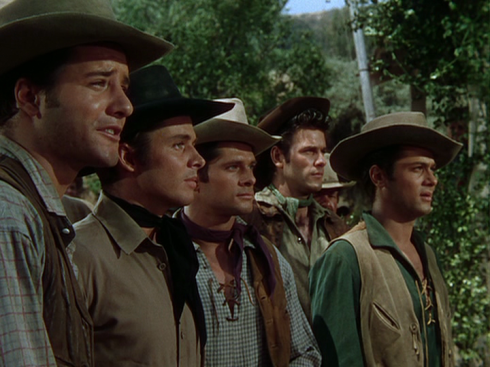
L-R: Richard Long, Audie Murphy, Dewey Martin, James Best, Tony Curtis as members of Quantrill’s renegade army in KANSAS RAIDERS
THE RED BADGE OF COURAGE (1951)
Murphy finally started to get taken seriously as a movie lead after this film, sensitively directed by John Huston who had served in the war himself and knew what Murphy had gone through. Significant attention is given to this film in Don Graham’s biography. MGM butchered the film and cut it down to 69 minutes after disastrous preview screenings.
THE CIMARRON KID (1951)
…one of about two dozen westerns Audie Murphy did at Universal Pictures in the period from 1950 to 1966. In brief, it tells the story of outlaw Bill Doolin who rode with the infamous Dalton gang in the disastrous raid on Coffeyville, Kansas, and went on to lead the gang’s survivors in a subsequent robbery spree. Murphy plays Doolin as a misunderstood youth who gets forced into a life of crime through guilt by association and the persecution of an overzealous railroad detective. Further complications ensue when Doolin falls in love with a rancher’s daughter who wants him to go straight.
DUEL AT SILVER CREEK (1952)
Here’s an excerpt from my write-up on this film for Don Siegel Centennial
The action is fast and furious throughout, with lots of fights, shootouts and chases to fill up the film’s 77 minutes. There’s a bit of contrivance at the end to provoke the final shootout between the posse and the claim jumpers, but the script moves tidily up to that point, putting this one in the top rank of Murphy westerns, enabling Siegel to show off his command of onscreen action. I once read somewhere, although I can’t find the quote now, that Siegel claimed that Murphy had no confidence as an actor until Siegel’s coaching on this film. I’m a huge fan of Murphy and have seen most of his films…and I can say that Murphy certainly seems more relaxed in this film than in his earlier westerns. (Although I must say that the tension he may have felt as an inexperienced actor in KANSAS RAIDERS, THE KID FROM TEXAS, and THE CIMARRON KID definitely added to the characters he played in those films.)
DRUMS ACROSS THE RIVER (1954)
Unassuming war hero-turned-western star Murphy was at his best in parts like this, playing an ordinary westerner caught up in a tumultuous situation and having to fight his way out and summon up the moral courage to do the right thing. He always looked best when he faced down truly formidable bad guys and here he faces one of the best western villains of the 1950s. Lyle Bettger, who had one of the most sinister smiles in movie history, specialized in corrupt western capitalists (ranchers, miners, saloon owners, railroad men) who could be utterly smooth and charming one minute and murderously evil the next.
TO HELL AND BACK (1955)
Significant attention is given to this film in Don Graham’s biography. I re-watched it for this piece and despite Murphy’s ambivalence about it, it’s still quite a gripping depiction of the war in Europe and what Murphy and his platoon mates went through. It’s very much worth seeing and offers one of his strongest performances.
WALK THE PROUD LAND (1956)
Murphy plays John Clum, later more famous as a newspaper editor in Tombstone, who is assigned as an Indian Agent to the San Carlos Apache Indian Reservation in Arizona Territory. Anne Bancroft plays an Apache woman who aids his efforts. Jay Silverheels plays Geronimo.
THE GUNS OF FORT PETTICOAT (1957)
Murphy plays an army deserter who leads a group of female homesteaders into an abandoned mission to defend against a Comanche attack. My sole note on Murphy in this from the last time I saw it: “Murphy is as good as I’ve ever seen him.”
RIDE A CROOKED TRAIL (1958)
RIDE A CROOKED TRAIL (1958) is an Audie Murphy western distinguished by a good script and a flamboyant early role for Walter Matthau as a silver-haired, hard-drinking, shotgun-toting judge in a growing river town. It has surprisingly little action for a Murphy western, but it’s compelling and quite entertaining thanks to a group of interesting characters, a good cast and a script by Borden Chase (WINCHESTER ’73, THE FAR COUNTRY, BACKLASH).
Murphy was always at his best when surrounded by strong co-stars and here he’s got Matthau as a sort-of good-guy mentor; Gia Scala as a femme fatale ripe for reform and Henry Silva as an outlaw gang leader. Murphy plays a wanted outlaw mistaken by Matthau for a missing marshal (who’d fallen off a cliff while going after Murphy) and soon has to assume the functions of the marshal’s office in order to keep up his charade and escape detection.
NO NAME ON THE BULLET (1959)
Murphy plays a famous hired gun who comes to town and stays, worrying all the townspeople, each of whom has a secret to hide and thinks he may have come after them. Directed by Jack Arnold.
THE WILD AND THE INNOCENT (1959)
I liked this one a great deal. It’s character-oriented rather than action-oriented. It’s very suspenseful as Audie resists Dee’s affections for 83 of the film’s 84 minutes. He foolishly pursues Dru, without knowing what she really is. Roland comes on to Dee like a pimp, which is basically what he plays. Amazing how Audie outshoots fast-draw Roland at the end. I’d say this is one of Murphy’s best performances.
CAST A LONG SHADOW (1959)
Very good Murphy western. Possibly one of his best. Very good script and dramatic scenes building up to suspenseful cattle drive and stampede, using stock footage from RED RIVER, which is probably why this is in black-and-white. The plot is similar to RED RIVER with the Murphy-Dehner relationship matching that of Clift and Wayne, only the Wayne character apologizes and returns to help.
HELL BENT FOR LEATHER (1960)
This is another one that’s decidedly minor, but has lots of really good stuff in it. The basic premise is a bit forced, but it does offer lots of movement and chances for actors to do their stuff and the cinematographer to capture Lone Pine, CA and the backdrop of the Sierras in all their rugged glory.
Murphy plays a really persecuted character here, so his intense, pained expression really comes in handy….
Murphy is very good. This is his kind of part. Persecuted and put-upon and a victim, but feisty and always trying to get out of a scrape.
SEVEN WAYS FROM SUNDOWN (1960)
Audie is very good as a fairly naïve, green Texas Ranger who has to learn on the job awful quickly. He’s evidently bitten off more than he can chew and finds himself challenged at every turn. There’s genuine suspense here. He has this tortured, persecuted air about him in so many of these later films that serves him well in these parts.
Sullivan is very smooth and charming. A real movie star. It’s one of his best parts. He’s great in stuff like FORTY GUNS and MAVERICK QUEEN, but he gets to show off here. And it’s fun.
POSSE FROM HELL (1961)
When vicious killer Vic Morrow and his gang, including Lee Van Cleef, raid the town of Paradise, rob the bank, take a young woman hostage, kill five people and flee, gunslinger Audie Murphy is deputized by his friend, the mortally wounded town marshal, and leads the posse in pursuit. The focus is on the internal dynamics of the posse and how its members fare under pressure, with an irritated Murphy preferring to go it alone until two of them prove their worth and remain with him: Rodolfo Acosta as an Indian who’s faced much discrimination from the town and John Saxon as a bank employee from New York assigned by the bank president to safeguard the stolen money once it’s found. I re-watched the film for this piece and it’s easily one of Murphy’s best and one of his best performances. It deserves its own full review. Directed by Herbert Coleman and scripted by Clair Huffaker based on his own novel.
GUNFIGHT AT COMANCHE CREEK (1964)
Murphy is more relaxed than usual here, playing someone older, more experienced and more confident than the young tormented loner he usually played. He’s even something of a womanizer, a character touch not often applied to his roles. The star generally thrived when faced with formidable bad guys and he’s got a colorful rogues’ gallery to contend with here, including DeForest Kelley (“Star Trek”) as the head of the gang and Adam Williams (NORTH BY NORTHWEST) and Mort Mills (TOUCH OF EVIL, PSYCHO) as convincingly snarling heavies.
Finally, here’s a shot of Murphy from his final starring western, 40 GUNS TO APACHE PASS (1967):
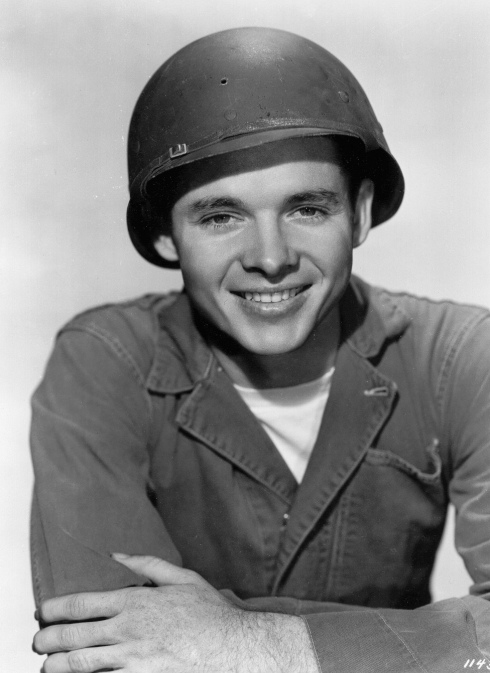
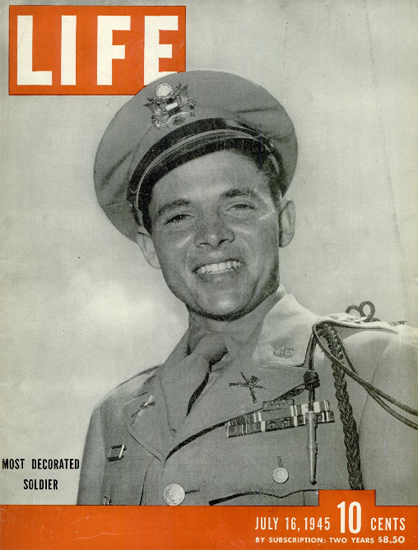
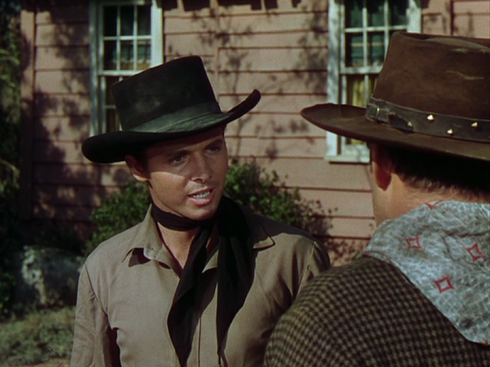
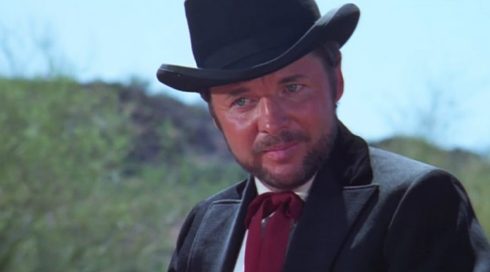
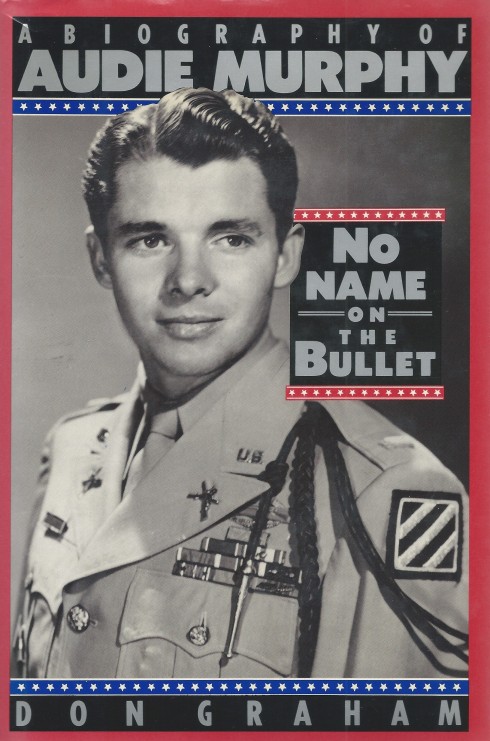
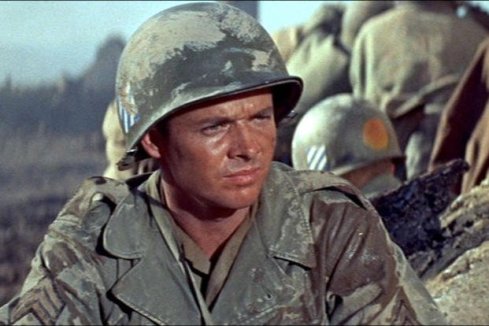
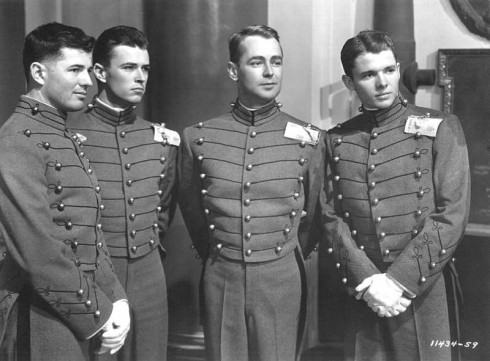
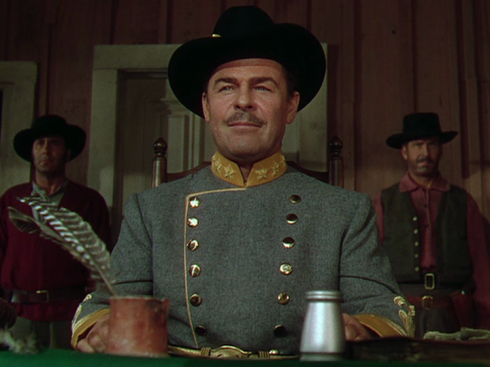
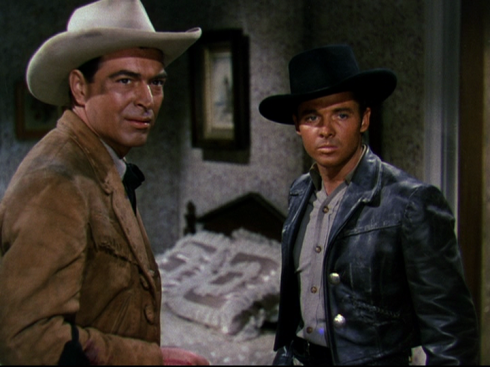

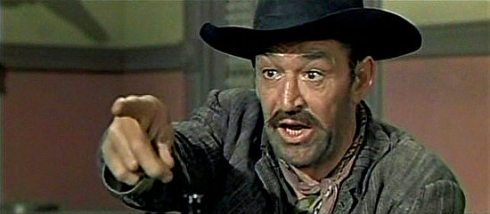
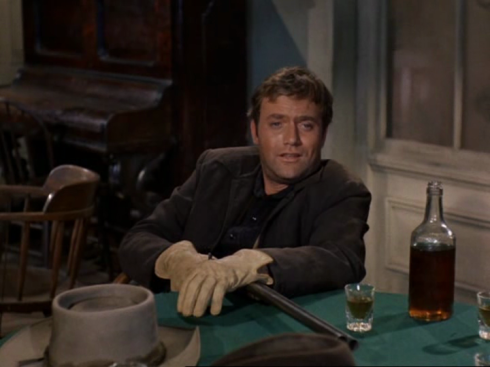

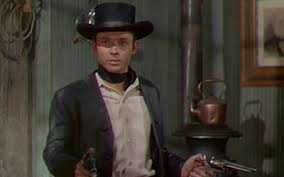
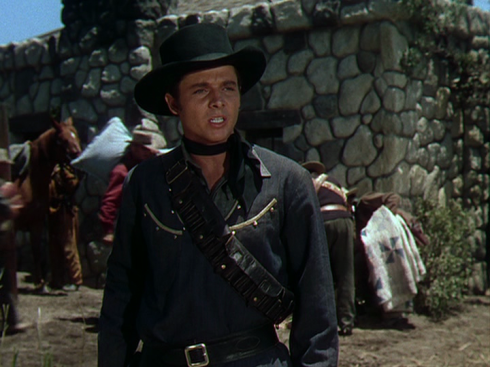
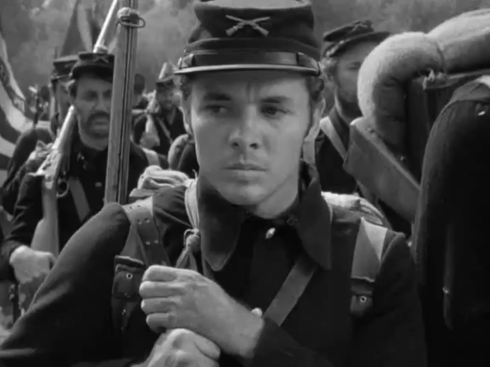
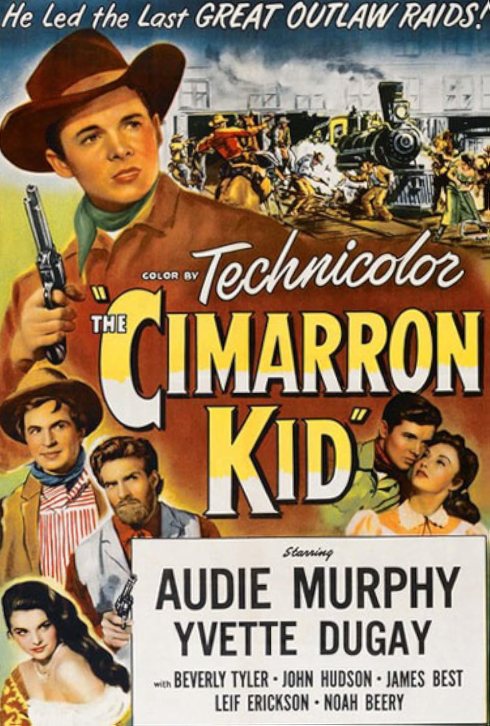
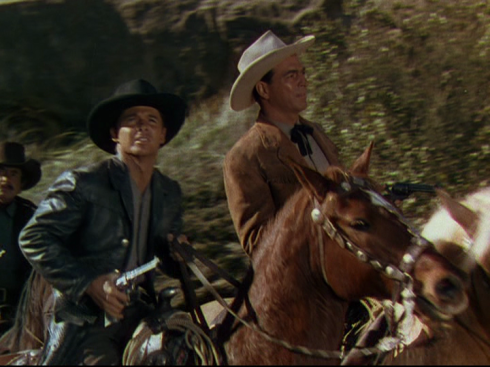
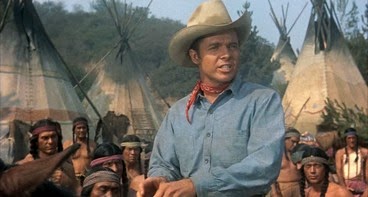

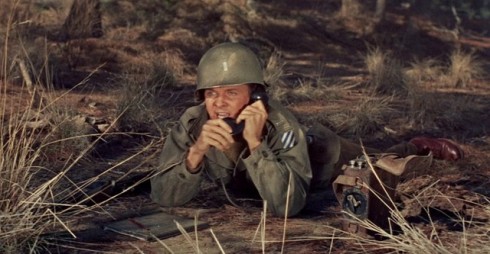
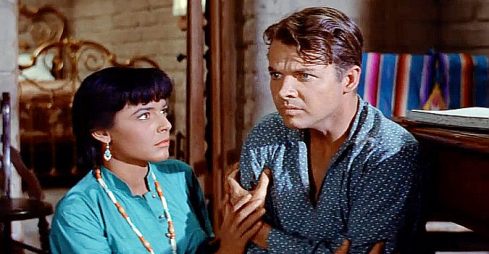
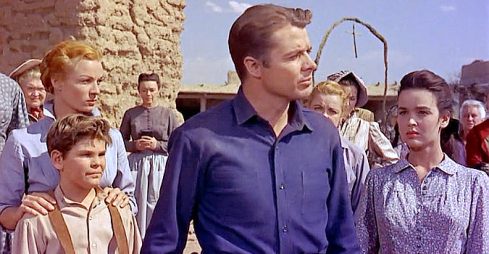
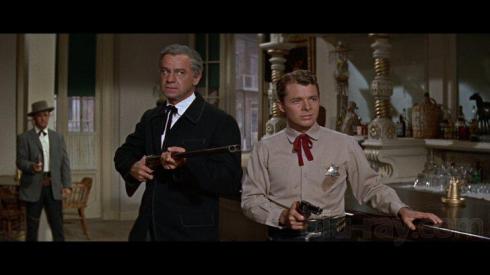
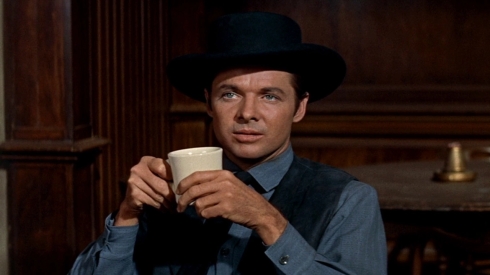
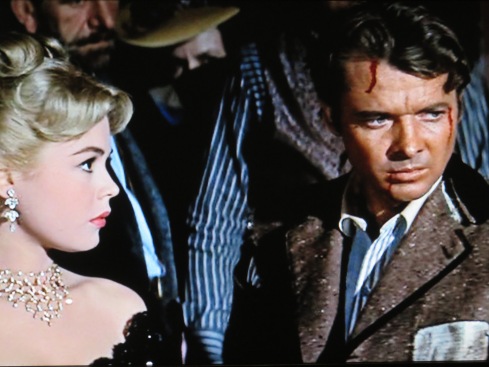

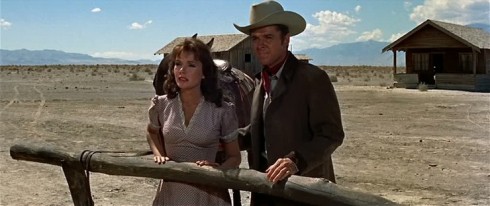
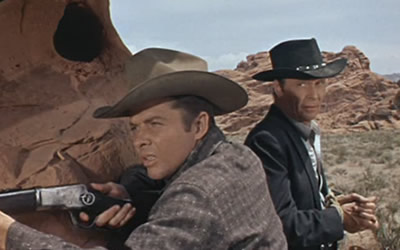

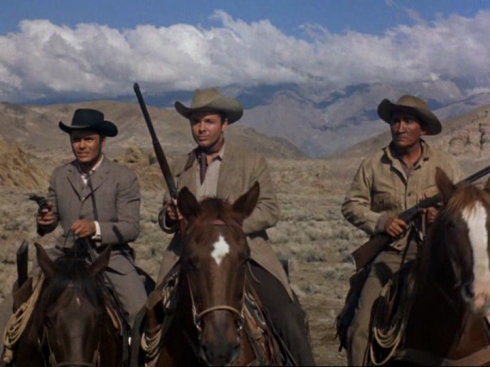
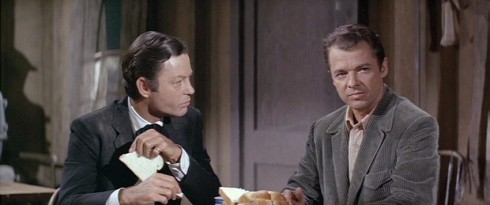
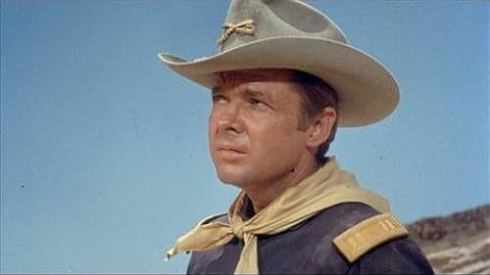
Leave a comment